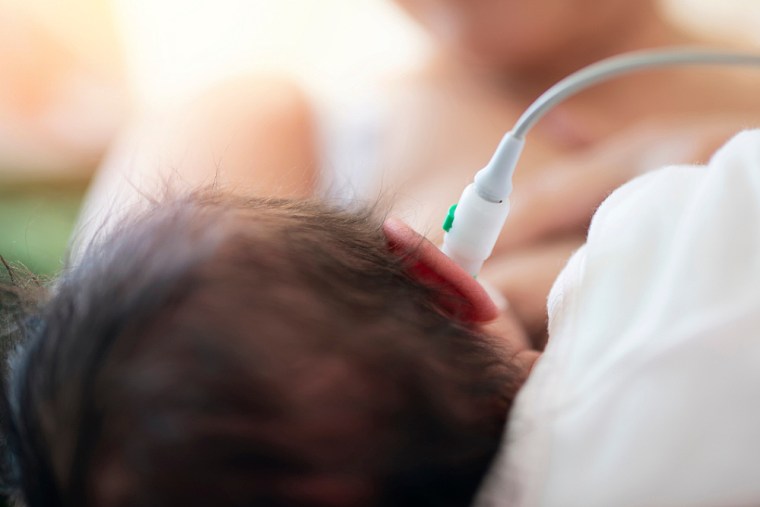The newborn hearing screening test is a simple screening designed to detect if your baby has any hearing loss. Learn about the importance of doing this test at an early age.
What is a newborn hearing screening? This test is essential to help diagnose any hearing problems your baby may have. It is normal for parents and caregivers to have doubts about the most appropriate time to carry out this test.
To help you, here we will answer frequently asked questions about the newborn hearing screening. You will learn how this procedure is performed, when it can be done, and what you can do if the result shows a hearing loss. Keep reading!
What Is a Newborn Hearing Screening?
Did you know that even before birth, your baby can already hear? When your child is still in the womb, around the fifth month of pregnancy, they can hear the sounds your body makes, as well as the voices of the people who are around them.
However, one or two out of every thousand babies may be born with permanent hearing loss in one or both ears. It should be noted that, most of the time, the problem is diagnosed in newborns who do not have a family history of hearing loss.
Therefore, to check if your little one has a hearing problem, it is necessary to perform the newborn hearing screening. For that, one of these methods can be used:
- Automated Auditory Brainstem Response (AABR) – in this screen, electrodes will be placed on your newborn’s head to check their hearing nerve and brain’s response.
- Otoacoustic Emissions – in this procedure, a small probe is placed inside your newborn’s ear canal to check the echo when sounds are played into your little one’s ears.
The lack of response to the stimulus of these tests indicates that there are functional abnormalities in your child’s audition. But don’t worry, the tests don’t cause any pain. Also, they are done quickly and are safe for your little one.
Why Is It Important To Do This Screening Test?
When the diagnosis of hearing loss is made at an early stage, early care can be provided. According to some studies, children with hearing problems who receive timely interventions can make progress in areas such as speech, school progress, and self-esteem.
After all, hearing is one of the most important senses for your baby’s development. Your child will develop their language by listening. If your little one has hearing loss, this condition can prevent them from receiving the information they need to learn to speak.
Also, language develops during the child’s first six months. This is another reason why hearing problems should be addressed as soon as possible. Thus, an early diagnosis can help families find the most appropriate solutions to their babies’ needs.
When Can My Baby Have Their Newborn Hearing Screening Done?
The American Academy of Pediatrics (AAP) recommends that all babies have a newborn hearing screening before completing 1 month of age – ideally before going home from the hospital. The result of the test is obtained as soon as the screening is completed.
A study conducted by the Centers for Disease Control and Prevention (CDC) showed that babies with hearing loss identified before three months of age and who received care before six months developed better vocabulary than those who were diagnosed and intervened later. One more reason for performing the test as early as possible!
What To Do If The Result Shows a Hearing Loss?
Now that you have seen how a newborn hearing screening is performed and why it is so important, you may be wondering what to do if the result shows an abnormality. If this happens, the doctor will likely do the test one more time.
Sometimes the first test does not give clear answers, because the result is likely to indicate other things. If your baby is fussy, this can interfere with the exam. In case of background noise, the test may also be affected. The child could even have a blocked inner ear.
However, if the result is negative, the baby should undergo clinical and audiological care to confirm any hearing loss. Thereafter, further testing may be needed to identify the problem.
Your child’s pediatrician or otolaryngologist may order additional tests. These exams can be performed by a healthcare professional qualified to evaluate hearing: the audiologist.
Also, even if your child’s newborn hearing screening is fine, it’s important to keep monitoring their hearing. Your baby may develop hearing loss after the test. Therefore, your little one’s development should be constantly observed by an expert.
After reading this article, you now understand why a newborn hearing screening should be done and when is the best time to do it. An early diagnosis of any hearing problem can promote your baby’s speech development and self-esteem.
Did you like learning about this topic? Take the opportunity to download Kinedu for FREE and access other articles like this and +1,800 activities to foster your baby’s development at home!








